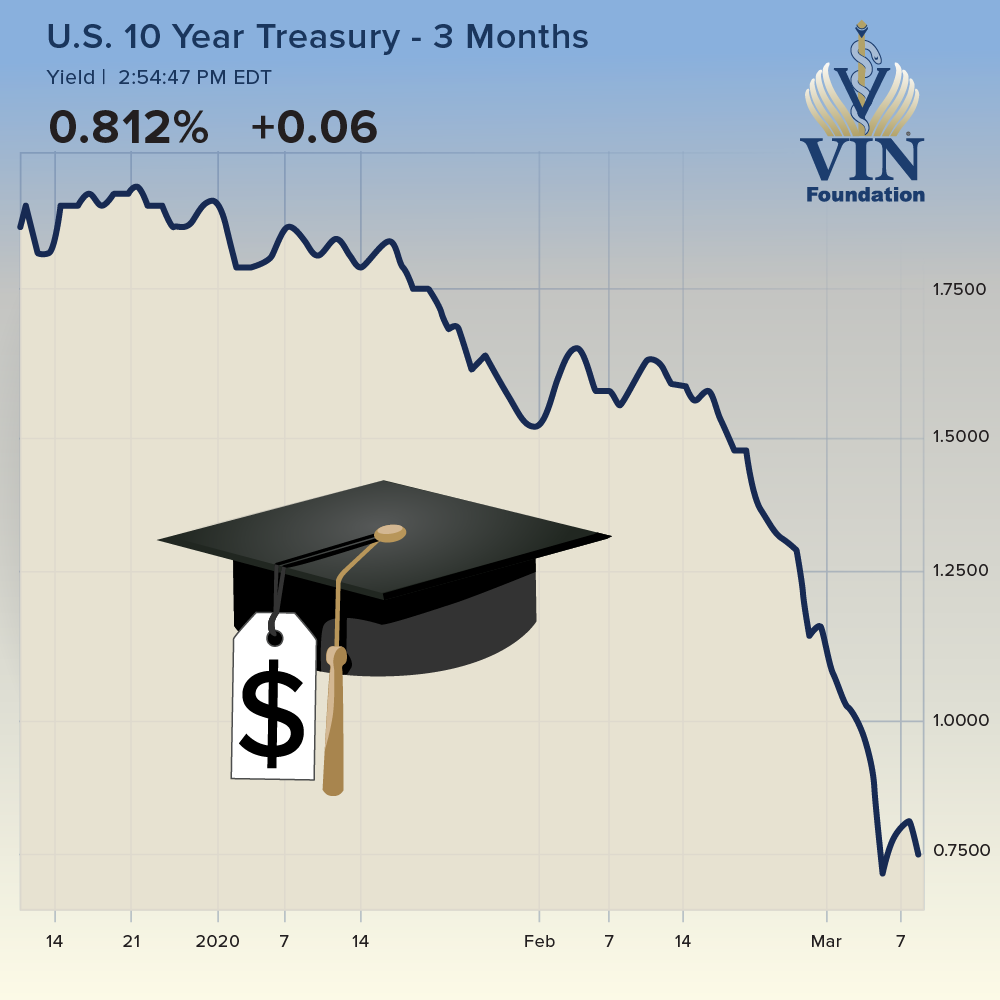HOW TO KNOW IF OR WHEN YOU SHOULD REFI YOUR FEDERAL STUDENT LOANS
Managing your veterinary student debt can be as emotionally charged as managing patients. But, in finances as in medicine, the best decisions are evidence-based.
The bombardment of marketing campaigns encouraging you to refinance your federal student loans into a private loan(s) can be overwhelming. Claims of lower interest rates and faster, less expensive payoff are attractive and tempting. Entertaining these offers is a risky venture for most recent graduate veterinarians.
If you remember one thing from reading this: A LOWER STUDENT LOAN INTEREST RATE DOES NOT EQUAL LOWER PAYMENT; nor does it always equal lower repayment costs. If you’d like to know why, read on!
With interest rates at a historic low and the Federal Reserve cutting rates again due to the COVID-19 outbreak, you’re certain to receive even more offers from companies like SoFi, Credible, Earnest, etc. telling you how much money you can save if you refinance your student loans.
Before entertaining these offers, be certain you understand what you’re giving up when you refinance your federal student loans. Because once you refinance and leave the federal student loan program, you cannot undo that decision.
In order to know if or when you should refinance your student loans, you first need to expand the discussion beyond a simple claim of lower interest rates.
The majority of veterinarians who borrow graduate with a student debt to income ratio (DIR) greater than one, meaning their student debt balance exceeds their income.
When your DIR is greater than one, a refinance will most likely result in a higher monthly payment and less flexibility than you have with your current Federal student loans.
Unfortunately, not all loans are created equal. And while your Federal student loans likely have a higher interest rate, they come with beneficial terms, including income-driven repayment (IDR) options, public service loan forgiveness, and discharge provisions that you are unlikely to receive if you switch to a private loan. Review this summary list of considerations before refinancing your Federal student loans.
"When your DIR is greater than one, a refinance will most likely result in a higher monthly payment and less flexibility than you have with your current Federal student loans."
Let’s say you refinance your student loans at a favorable rate of 3% fixed while earning the Bureau of Labor and Statistics (BLS) average of $94,000 per year as a veterinarian with a family size of one. Here’s how that stacks up for various student loan balances and loan term lengths:
Private refinance repayment Options @ 3% |
Federal IDR programs |
|||
| Student loan balance | 7-year cost per month | 10-year cost per month | 15-year cost per month | PAYE/REPAYE/IBR 2014 per month |
| $100,000 | $ 1,321 | $ 966 | $ 691 | $ 624 |
| $200,000 | $ 2,643 | $ 1,931 | $ 1,381 | $ 624* |
| $300,000 | $ 3,964 | $ 2,897 | $ 2,071 | $ 624* |
| $400,000 | $ 5,285 | $ 3,862 | $ 2,762 | $ 624* |
* May be subject to forgiveness and subsequent tax due on canceled amount.
As illustrated in the table above, if your DIR is greater than 1, even cutting your interest rate by 50%, results in a much higher monthly payment than if you take advantage of the federal income-driven repayment (IDR) plans.
CUTTING YOUR INTEREST RATE MIGHT BE ATTRACTIVE IF YOUR GOAL IS TO BE DEBT-FREE AS SOON AS POSSIBLE, BUT CONSIDER THE FOLLOWING:
- The more cash flow you have at your disposal, the more opportunities you have to boost other areas of your financial and personal wellness, like building an emergency fund, saving for retirement, buying a home, buying or starting a practice, starting a family, taking a vacation, etc.
- If your credit history is not stellar or robust, you may have to bring a co-signer to your refinance. This situation can put your co-signer at risk should something terrible happen to you during repayment or if you stop making payments on your student loans for any reason.
- If your income decreases or is interrupted for a time may be due to a move or maternity leave, your IDR payment decreases; most private loans expect you to continue to pay the same amount per month regardless of changes to your income.
Your federal student loans do not have these risks associated with them. All federal student loans have the same contractual terms that you can readily review by accessing your Master Promissory Note at studentaid.gov.
All private loans have different terms and conditions. Before refinancing, review them carefully or even pay a professional to see if there are unfavorable terms you would want to negotiate away if possible.
WHEN A PRIVATE REFINANCE OF STUDENT LOANS CAN MAKE SENSE:
- You are refinancing less beneficial private student loan(s) with a more beneficial private student loan. Some of you may have private student loans from before veterinary school with double-digit interest rates. This is a great time to refinance those student loans!
- Your DIR is less than one and you are reasonably certain it will remain there for the duration of your student loan repayment.
Interest rates are at historic lows. However, student loan balances are at historic highs. Refinancing your student loans goes way beyond interest rates. Don’t put your personal finances and wellness at risk for a lower interest rate until your DIR allows for it.
Have questions? We’re here to help! Send an email to studentdebt@vinfoundation.org or leave a comment below. If you’re not sure how to evaluate your income-driven repayment plan eligibility or compare the various repayment options, try the tools available on the VIN Foundation Student Debt Center. And if you know someone who would benefit from this information, please share!

Tony Bartels, DVM, MBA
Dr. Tony Bartels graduated in 2012 from the Colorado State University combined MBA/DVM program and is an employee of the Veterinary Information Network (VIN) and a VIN Foundation Board member. He and his wife have more than $400,000 in veterinary-school debt that they manage using federal income-driven repayment plans. By necessity (and now obsession), his professional activities include researching and speaking on veterinary-student debt, providing guidance to colleagues on loan-repayment strategies and contributing to VIN Foundation initiatives.


1 thought on “Should I Refinance My Federal Student Loans?”
Very nice article, exactly what I needed. Very useful post I really appreciate thanks for sharing such a nice post. Thanks